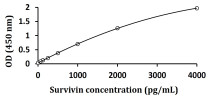ARG83164
Monkey Survivin ELISA Kit
Monkey Survivin ELISA Kit for ELISA and Monkey
Overview
| Product Description | ARG83164 Monkey Survivin ELISA Kit is an Enzyme Immunoassay kit for the quantification of Monkey Survivin in Serum, Plasma and Cell culture supernatants. |
|---|---|
| Tested Reactivity | Mk |
| Tested Application | ELISA |
| Specificity | There is no detectable cross-reactivity with other relevant proteins. |
| Target Name | Survivin |
| Conjugation | HRP |
| Conjugation Note | Substrate: TMB and read at 450 nm. |
| Sensitivity | 3 pg/ml |
| Detection Range | 62.5 pg/ml - 4,000 pg/ml |
| Sample Type | Serum, Plasma and Cell culture supernatants |
| Precision | Intra-Assay CV: 5.1% Inter-Assay CV: 6.3% |
| Alternate Names | API4; Apoptosis inhibitor 4; EPR-1; Apoptosis inhibitor survivin; Baculoviral IAP repeat-containing protein 5 |
Application Instructions
| Assay Time | ~ 5 hours |
|---|
Properties
| Form | 96 well |
|---|---|
| Storage Instruction | Store the kit at 2-8°C. Keep microplate wells sealed in a dry bag with desiccants. Do not expose test reagents to heat, sun or strong light during storage and usage. Please refer to the product user manual for detail temperatures of the components. |
| Note | For laboratory research only, not for drug, diagnostic or other use. |
Bioinformation
| Gene Symbol | BIRC5 |
|---|---|
| Gene Full Name | baculoviral IAP repeat containing 5 |
| Background | This gene is a member of the inhibitor of apoptosis (IAP) gene family, which encode negative regulatory proteins that prevent apoptotic cell death. IAP family members usually contain multiple baculovirus IAP repeat (BIR) domains, but this gene encodes proteins with only a single BIR domain. The encoded proteins also lack a C-terminus RING finger domain. Gene expression is high during fetal development and in most tumors, yet low in adult tissues. Alternatively spliced transcript variants encoding distinct isoforms have been found for this gene. [provided by RefSeq, Jun 2011] |
| Function | Multitasking protein that has dual roles in promoting cell proliferation and preventing apoptosis (PubMed:9859993, PubMed:21364656, PubMed:20627126, PubMed:25778398, PubMed:28218735). Component of a chromosome passage protein complex (CPC) which is essential for chromosome alignment and segregation during mitosis and cytokinesis (PubMed:16322459). Acts as an important regulator of the localization of this complex; directs CPC movement to different locations from the inner centromere during prometaphase to midbody during cytokinesis and participates in the organization of the center spindle by associating with polymerized microtubules (PubMed:20826784). Involved in the recruitment of CPC to centromeres during early mitosis via association with histone H3 phosphorylated at 'Thr-3' (H3pT3) during mitosis (PubMed:20929775). The complex with RAN plays a role in mitotic spindle formation by serving as a physical scaffold to help deliver the RAN effector molecule TPX2 to microtubules (PubMed:18591255). May counteract a default induction of apoptosis in G2/M phase (PubMed:9859993). The acetylated form represses STAT3 transactivation of target gene promoters (PubMed:20826784). May play a role in neoplasia (PubMed:10626797). Inhibitor of CASP3 and CASP7 (PubMed:21536684). Essential for the maintenance of mitochondrial integrity and function (PubMed:25778398). Isoform 2 and isoform 3 do not appear to play vital roles in mitosis (PubMed:12773388, PubMed:16291752). Isoform 3 shows a marked reduction in its anti-apoptotic effects when compared with the displayed wild-type isoform (PubMed:10626797). [UniProt] |
| Cellular Localization | Cytoplasm. Nucleus. Chromosome. Chromosome, centromere. Cytoplasm, cytoskeleton, spindle. Chromosome, centromere, kinetochore. Midbody. Note=Localizes at the centromeres from prophase to metaphase, at the spindle midzone during anaphase and a the midbody during telophase and cytokinesis. Accumulates in the nucleus upon treatment with leptomycin B (LMB), a XPO1/CRM1 nuclear export inhibitor (By similarity). [UniProt] |
| PTM | Ubiquitinated by the Cul9-RING ubiquitin-protein ligase complex, leading to its degradation. Ubiquitination is required for centrosomal targeting. In vitro phosphorylation at Thr-117 by AURKB prevents interaction with INCENP and localization to mitotic chromosomes (PubMed:14610074). Phosphorylation at Thr-48 by CK2 is critical for its mitotic and anti-apoptotic activities (PubMed:21252625). Phosphorylation at Thr-34 by CDK15 is critical for its anti-apoptotic activity (PubMed:24866247). Phosphorylation at Ser-20 by AURKC is critical for regulation of proper chromosome alignment and segregation, and possibly cytokinesis. Acetylation at Lys-129 by CBP results in its homodimerization, while deacetylation promotes the formation of monomers which heterodimerize with XPO1/CRM1 which facilitates its nuclear export. The acetylated form represses STAT3 transactivation. The dynamic equilibrium between its acetylation and deacetylation at Lys-129 determines its interaction with XPO1/CRM1, its subsequent subcellular localization, and its ability to inhibit STAT3 transactivation. [UniProt] |
Images (1) Click the Picture to Zoom In
| Title | Download Link |
|---|---|
| ARG83164 Monkey Survivin ELISA Kit User manual |
 Download Download
|






